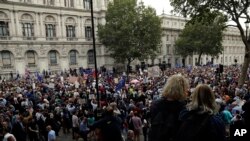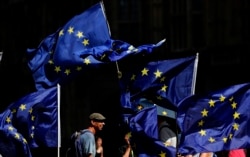British Prime Minister Boris Johnson continued to face mounting criticism Thursday over his move to suspend parliament until mid-October, only weeks before Britain's scheduled departure from the European Union.
Wednesday's move quickly drew anger from lawmakers opposed to his planned withdrawal from the EU on October 31 without a deal and cuts the time they will have to try to block him and avoid the risk of a disorderly separation.
Johnson's maneuver sparked protests outside parliament and in other towns and cities. An online petition against the move has been signed by more than 1 million people.
The move has also sparked friction within Johnson's Conservative Party and triggered accusations from critics that the government was threatening Britain's democracy by dismissing the norms of the country's unwritten constitution.
House of Commons leader Jacob Rees-Mogg, however, is defending Johnson's move. He described the backlash in a BBC interview as "phony" and said it's generated by people who "don't want the benefits of leaving the European Union."
Legal challenges have also been announced. Legislators have asked a Scottish court to rule the suspension of parliament illegal. And leading anti-Brexit campaigner Ginal Miller said she has applied for an expedited judicial review challenging the "effect and the intention" of the suspension.
European Union foreign and defense ministers, meeting in Helsinki Thursday, urged Britain to opt for an orderly Brexit. Some ministers, including Dutch Foreign Minister Stefan Blok, warned that the suspension increased the risk of a chaotic split.
"It's in nobody's interest to see a no-deal Brexit," Blok said.
Johnson's announcement came three years after voters narrowly decided to leave the EU, 46 years after it joined the 28-nation bloc.
Queen Elizabeth, as the head of state, approved Johnson's plan to suspend parliament. She will reopen parliament October 14 with an address outlining the government's legislative priorities.
Johnson said that would give parliamentarians favoring and opposing Brexit "ample time" for debate ahead of an October 17-18 summit of EU leaders, who could reach an ultimate decision on whether Britain leaves the EU with or without a separation deal spelling out the terms of its departure.
Johnson said it was "completely untrue" the suspension of parliament was intended to block lawmakers from thwarting his Brexit plans. Rather, he said, it was to "bring forward a new, bold and ambitious domestic legislative agenda for the renewal of our country after Brexit."
Johnson's action came one day after six opposition parties pledged to try to reach an agreement on how they would block a no-deal Brexit, rather than attempt to bring down the government, with Johnson holding only a single-seat majority.
House of Commons Speaker John Bercow called Johnson's suspension of parliament a "constitutional outrage." He said Johnson's intention is "to stop parliament debating Brexit and performing its duty in shaping a course for the country."
Bercow added, "Shutting down parliament would be an offense against the democratic process."
John McDonnell, the second most powerful lawmaker in the opposition Labour Party, said, "Make no mistake, this is a very British coup. Whatever one's views on Brexit, once you allow a prime minister to prevent the full and free operation of our democratic institutions you are on a very precarious path."
Sarah Wollaston, a former Conservative lawmaker who now sits with the Liberal Democrats, said Johnson was "behaving like a tin pot dictator."
Twenty-five Church of England bishops attacked plans for a no-deal Brexit, saying in an open letter the economic upheaval that might occur would particularly hurt the poor and other vulnerable people.
U.S. President Donald Trump weighed in on Twitter, showing continued support for Johnson.
"Would be very hard for Jeremy Corbyn, the leader of Britain’s Labour Party, to seek a no-confidence vote against New Prime Minister Boris Johnson, especially in light of the fact that Boris is exactly what the U.K. has been looking for, & will prove to be 'a great one!' Love U.K.," Trump said.
Johnson's predecessor, Theresa May, failed three times to get parliament to agree to a Brexit deal her negotiators reached with the EU, leading directly to Johnson's election as head of the Conservatives and becoming prime minister.
According to Dominic Grieve, a leading Conservative rebel and a former attorney general, the suspension will mean that lawmakers will have just seven days in practical terms in which to ensure they can block a no-deal Brexit.
He warned the move could backfire on Johnson and act as a unifying factor in securing a majority to pass next week a no-confidence motion in the government, bring it down and trigger an election, or pass legislation seeking to prevent a no-deal Brexit.
Johnson leads a minority Conservative government whose one-seat majority relies on a Northern Ireland party. But there is a majority in parliament against a so-called no-deal Brexit.
Philip Hammond, the former chancellor of the exchequer in May's government, tweeted: “It would be a constitutional outrage if Parliament were prevented from holding the government to account at a time of national crisis. Profoundly undemocratic.”
Prorogation is rare
The suspension of parliament, known as prorogation, is normally a constitutional formality in which the legislature is suspended for a few days, generally every British autumn, ahead of the government setting out a fresh parliamentary agenda in a speech delivered by the monarch.
Aside from the practical politics, the prorogation Johnson has successfully secured from the queen is highly unusual. Only four times in history — in 1628, 1831, 1948 and 1997 — has either a monarch or the government engineered a prorogation to hinder Parliament from debate.
The prorogation in 1628 by Charles I lit the fuse for the English Civil War. The 1831 prorogation delayed a major reform act, and the 1948 suspension assisted Clement Attlee's Labor government in nationalizing key British industries. In 1997, then-Prime Minister John Major used prorogation to stop a cash-for-questions scandal.
As lawmakers from all parties reacted with outrage at the prorogation, the leader of Britain’s main opposition Labor Party, Jeremy Corbyn, added to the high drama by writing to the queen, warning her that granting the suspension was “against the wishes of a majority of the House of Commons.” Corbyn was accused of dragging the monarch into the Brexit dispute, something Johnson's foes are accusing him of doing.
Corbyn demanded to see the queen before agreeing to Johnson’s request, but his letter arrived too late.
Johnson’s supporters rallied to his defense, arguing that if he’d really wanted to shut out Parliament, he would have asked for a longer suspension right up to the day after the deadline. They said Parliament has had plenty of time to debate Brexit.
“Despite all the shock indignation about Parliament being prorogued there is nothing it can’t do next week or after 14th October that it could have done during the four weeks it won’t be sitting. One thing Brexit hasn’t lacked is time for open ended parliamentary debate,” tweeted Damian Collins, a pro-Brexit Conservative lawmaker.









